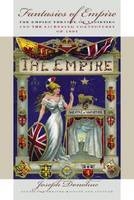
Fantasies of Empire
The Empire Theatre of Varieties and the Licensing Controversy of 1894
Seiten
2005
University of Iowa Press (Verlag)
978-0-87745-960-6 (ISBN)
University of Iowa Press (Verlag)
978-0-87745-960-6 (ISBN)
- Titel ist leider vergriffen;
keine Neuauflage - Artikel merken
What the controversy reveals about contemporary sexual and social relations? What light it sheds on opposing views on the place of art and entertainment in modern society? Addressing such issues, this book recounts, in full, the story of the Empire licensing controversy. It is useful for students of popular entertainment, urban studies, and more.
In the London summer of 1894, members of the National Vigilance Society, led by the well-known social reformer Laura Ormiston Chant, confronted the Empire Theatre of Varieties, Leicester Square, and its brilliant manager George Edwardes, as he applied for a routine license renewal. On grounds that the Empire's promenade was the nightly resort of prostitutes, that the costumes in the theatre's ballets were grossly indecent, and that the moral health of the nation was imperiled, Chant demanded that the London County Council either deny the theatre its license or require radical changes in the Empire's entertainment and clientele before granting renewal. The resulting license restriction and the tremendous public controversy that ensued raised important issues - social, cultural, intellectual, and moral - still pertinent today. ""Fantasies of Empire"" is the first book to recount, in full, the story of the Empire licensing controversy, in all its captivating detail. Contemporaneous accounts are interwoven with Donohue's identification and analysis of the larger issues raised: what the controversy reveals about contemporary sexual and social relations, what light it sheds on opposing views regarding the place of art and entertainment in modern society, and what it says about the pervasive effect of British imperialism on society's behavior in the later years of Queen Victoria's reign. Donohue connects the controversy to one of the most interesting developments in the history of modern theatre, the simultaneous emergence of a more sophisticated, varied, and moneyed audience and a municipal government insistent on its right to control and regulate that audience's social and cultural character and even its moral behavior. Rich in illustrations and entertainingly written, ""Fantasies of Empire"" will appeal to theatre, dance, and social historians, and to students of popular entertainment, the Victorian period, urban studies, gender studies, leisure studies, and the social history of architecture.
In the London summer of 1894, members of the National Vigilance Society, led by the well-known social reformer Laura Ormiston Chant, confronted the Empire Theatre of Varieties, Leicester Square, and its brilliant manager George Edwardes, as he applied for a routine license renewal. On grounds that the Empire's promenade was the nightly resort of prostitutes, that the costumes in the theatre's ballets were grossly indecent, and that the moral health of the nation was imperiled, Chant demanded that the London County Council either deny the theatre its license or require radical changes in the Empire's entertainment and clientele before granting renewal. The resulting license restriction and the tremendous public controversy that ensued raised important issues - social, cultural, intellectual, and moral - still pertinent today. ""Fantasies of Empire"" is the first book to recount, in full, the story of the Empire licensing controversy, in all its captivating detail. Contemporaneous accounts are interwoven with Donohue's identification and analysis of the larger issues raised: what the controversy reveals about contemporary sexual and social relations, what light it sheds on opposing views regarding the place of art and entertainment in modern society, and what it says about the pervasive effect of British imperialism on society's behavior in the later years of Queen Victoria's reign. Donohue connects the controversy to one of the most interesting developments in the history of modern theatre, the simultaneous emergence of a more sophisticated, varied, and moneyed audience and a municipal government insistent on its right to control and regulate that audience's social and cultural character and even its moral behavior. Rich in illustrations and entertainingly written, ""Fantasies of Empire"" will appeal to theatre, dance, and social historians, and to students of popular entertainment, the Victorian period, urban studies, gender studies, leisure studies, and the social history of architecture.
Joseph Donohue is a theatre historian and professor of English at the University of Massachusetts - Amherst. He is the author of numerous books and articles on British and Irish theatre and drama, including Dramatic Character in the English Romantic Age and Theatre in the Age of Kean. He is editor and part author of The Cambridge History of British Theatre, vol. 2, 1660-1895.
| Erscheint lt. Verlag | 30.11.2005 |
|---|---|
| Reihe/Serie | Studies in Theatre History and Culture |
| Zusatzinfo | 43 photos |
| Verlagsort | Iowa |
| Sprache | englisch |
| Themenwelt | Kunst / Musik / Theater ► Theater / Ballett |
| Geschichte ► Teilgebiete der Geschichte ► Kulturgeschichte | |
| ISBN-10 | 0-87745-960-6 / 0877459606 |
| ISBN-13 | 978-0-87745-960-6 / 9780877459606 |
| Zustand | Neuware |
| Haben Sie eine Frage zum Produkt? |
Mehr entdecken
aus dem Bereich
aus dem Bereich
der stille Abschied vom bäuerlichen Leben in Deutschland
Buch | Hardcover (2023)
C.H.Beck (Verlag)
23,00 €
Die Revolution des Gemeinen Mannes
Buch | Softcover (2024)
C.H.Beck (Verlag)
12,00 €
vom Mittelalter bis zur Gegenwart
Buch | Softcover (2024)
C.H.Beck (Verlag)
12,00 €


